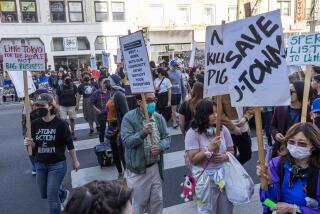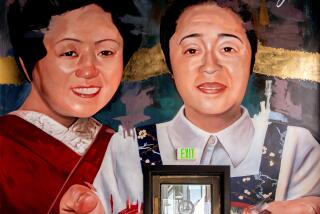New Emperor, Not New Emperor Worship
At the least, history will memorialize Japan’s Emperor Hirohito as one of the great dynastic survivors. His 62-year reign, longer than any measurable record among his 123 predecessors, puts him just behind late-stayers like Britain’s Victoria (64 years) and Austria-Hungary’s Franz Josef (68). The very length of his turbulent Showa era--literally “enlightened harmony”--imposed a kind of calendarist’s unity over six decades of contradictions that mingled technological and cultural modernization, atavistic imperialism, aggression and atrocities, devastating defeat, occupation, “democratization” and, finally, extraordinary economic expansion and prosperity.
For the sense of continuity that the emperor’s longevity gave them, most Japanese were duly grateful. Continuity is a form of security. So when Hirohito’s illness turned critical last September, his subjects were prepared to do him honor. Most public and private observances were canceled, from prime ministerial visits to office bashes for retiring directors. Weddings--or at least the more lavish wedding parties--were postponed. The nation’s ample supply of commentators, critics and editors began grinding out media retrospectives on the Showa era, while the country-at-large settled itself into an attitude of expectant mourning.
As the vigil lengthened past three months, the attitude of jishuku-- a kind of national “self-restraint”--began to fray around the edges. More and more people began to express concerns about the role of the emperor they were mourning in advance--specifically his personal responsibility for the war. Normally the emperor’s symbolic primacy in Japanese society is taken for granted, more or less like the Showa name on companies and calendars. Newspaper public-opinion polls, ritually taken on significant anniversary years, depict the average Japanese as supportive of the monarchy, if not wildly enthusiastic over it. But the abnormal length of the “self-restraint” period, and the tendency of many nationalists to re-create a prewar atmosphere of reverence for the emperor, have prompted serious second thoughts about the imperial institution.
Beyond doubt Hirohito’s greatest service to his people was to stop the war. By going on the air in August, 1945, and telling his countrymen that Japan must “endure the unendurable,” he put an end to the die-hard struggle of Japan’s militarists. He was to later readily accept the new role as a “symbol of the state” set out for him by the American-sponsored constitution. (He had earlier repudiated the concept that the emperor is divine.) His public duties were low-key and well within the limited assigned function of a royal head of state.
Through all the postwar years, however, the matter of the emperor’s responsibility for the war of brutal aggression waged in his name was rarely mentioned--one of the many things, like the prewar atrocities in China and Korea, which Japan’s Establishment, in the best traditions of negative consensus, has continued to sweep under the rug. As Japan grew ever richer and more confident, successive anniversaries of the Showa reign were greeted as triumphal occasions, with scarcely a mention of the wartime unpleasantness. A new breed of nationalists--some ruling Liberal Democratic Party leaders among them--began to argue that atrocities like the rape of Nanking never really happened. Cabinet officials’ appearances at the Shinto war shrines became more frequent. Lately, references to the ailing emperor--including the honorific language used--recalled the almost literal “emperor-worship” in the early days, with Hirohito on horseback, sending his troops off to battle.
For many Japanese this was too much. As a reader wrote not so long ago to Tokyo’s Asahi: “For 20 years, under the name and orders of the emperor, we fought wars, day in and day out. For the last 40 years we have been pursuing peace. To put these two periods into one and call it all the ‘60-year reign of the Showa Emperor’ makes no sense!”
This was no isolated comment. In fact, it probably reflects the thinking of a great many Japanese. (But ironically it took theprolonged vigil over the dying Emperor to bring such comments out in the open.) Over the past two months the emperor’s pre-1945 role has become the subject of increased public discussion, despite complaints and demonstrations by right-wingers and other latter-day nationalists. (The mayor of Nagasaki was recently ousted as a local Liberal Democratic Party adviser for publicly alluding to the emperor’s war responsibility.)
There is a more immediate political point to Hirohito’s passing, with implications for Japan’s national and international future. The succession rites for a Japanese monarch are a myth-encrusted mass of Shinto ritual, during which the new emperor, among other things, sleeps with the legendary sun goddess and then becomes her incarnation. There is little in the Shinto rubric of religious nationalism to cover constitutional monarchs.
Thus historian Daikichi Irokawa, in another Asahi article, has urged that to conform to the new constitution, there should be no enthronement without the public’s consent.
“Before a new monarch ascends the throne, the Diet should convene an emergency session and give the crown prince a vote of confidence. If this procedure is side-stepped because of undue reverence for the imperial institution, questions about Akihito’s legitimacy will persist . . . Japanese democracy is at stake.”
Japan’s imperial institution will surely continue, thanks to Hirohito’s faithfulness to the postwar constitution. Prince Akihito and Princess Michiko are about as popular and helpful as their roles permit. Indeed, given the materialism and general grabbiness of Japan’s ruling Establishment, a supra-partisan and modest monarchy has its uses. But thoughtful Japanese should do their best to diminish rather than increase the race-and-nation worship that still lies latent in the imperial institution, so that a new generation of Japanese nationalists does not exploit the new emperor, the way the prewar militarists ensnared his father.
More to Read
Sign up for Essential California
The most important California stories and recommendations in your inbox every morning.
You may occasionally receive promotional content from the Los Angeles Times.










